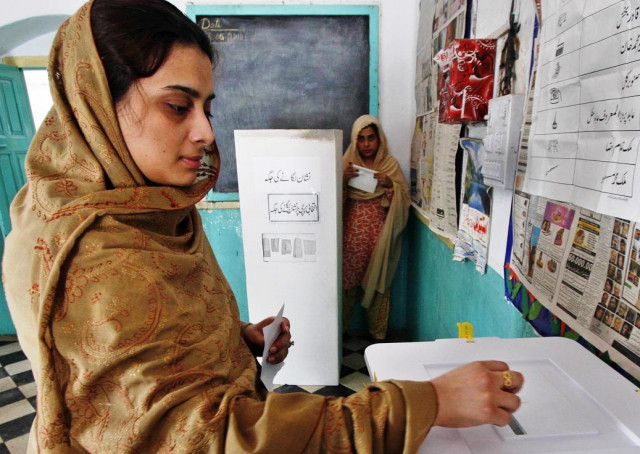After Jamrud killing, women back out of election duties
Experts claim this will have a negative impact on number of women voters in the region.

A file photo of a female voter taking part in by-elections in Rawalpindi. PHOTO: ONLINE
After Tuesday’s killing of schoolteacher Shehnaz Ishtiaq in Jamrud, Khyber Agency, women observers have refused to take part in election activities.
There are two constituencies, NA-45 (Jamrud, Landi Kotal and Mullagori) and NA-46 (Bara and Tirah) in the agency. The Free and Fair Election Network (Fafen) in collaboration with the All Women Advancement and Resource Development (AWARD) is working to promote awareness regarding elections in the tribal regions.
AWARD constituency coordinator for NA-46, Lal Jan Afridi, said an awareness drive had been launched in Khyber Agency. But because of targeted attacks on women, including teachers and aid workers, the drive has been affected to a great extent.

Afridi said two teams were working to promote awareness in each constituency and added incidents such as the one in Jamrud not only discouraged women from the tribal areas from working in the education sector, it affected people in all walks of life.
Shehnaz, the headmistress of a school in Shahkas, was shot while on her way to school with her 14-year-old son Daniyal.
Nearly 173 men and women will be hired in NA-45 to monitor the elections, while 163 will be hired in NA-46. Afridi said searching for qualified monitors had become difficult after the recent attack. “Some people do not want women to take part in elections,” he claimed.
Samiullah, AWARD constituency coordinator for NA-45, also claimed several qualified individuals had refused to take part in the observation process after the incident in Jamrud.

Polling stations for women had been established for the elections, but due to a lack of female observers, votes given by women may be greatly reduced.
According to Fafen, an Islamabad-based organisation that monitors elections, women were barred from voting at 564 of the country’s 64,176 polling stations in 2008.
Fafen Coordinator Mian Mumtaz Shah said polling stations would be established in Jalozai Camp for people displaced from Bara and Tirah.
He said arrangements would also be made in other accessible areas. People are generally more informed of the benefits of general elections this time, he said, adding this would motivate them to cast their votes.
A resident of Bara, Anwar Shah Afridi, however, said women’s participation in elections is against Islamic teachings and tribal culture, adding women would not be allowed to take part in the polls. “It is against our tribal custom and culture to allow women to mix with men and go outside their homes to vote.”
Another tribesman, Anwarullah Afridi, said many people had left the area because of worsening law and order situation. He said it was not possible for females to take part in the process in Bara.
Official data indicates that Pakistan has more than 48 million registered male voters and just over 37 million female registered voters, even though a report by the World Bank in 2012 claimed the country’s female population stood at 49.19%.
Published in The Express Tribune, March 30th, 2013.













COMMENTS
Comments are moderated and generally will be posted if they are on-topic and not abusive.
For more information, please see our Comments FAQ